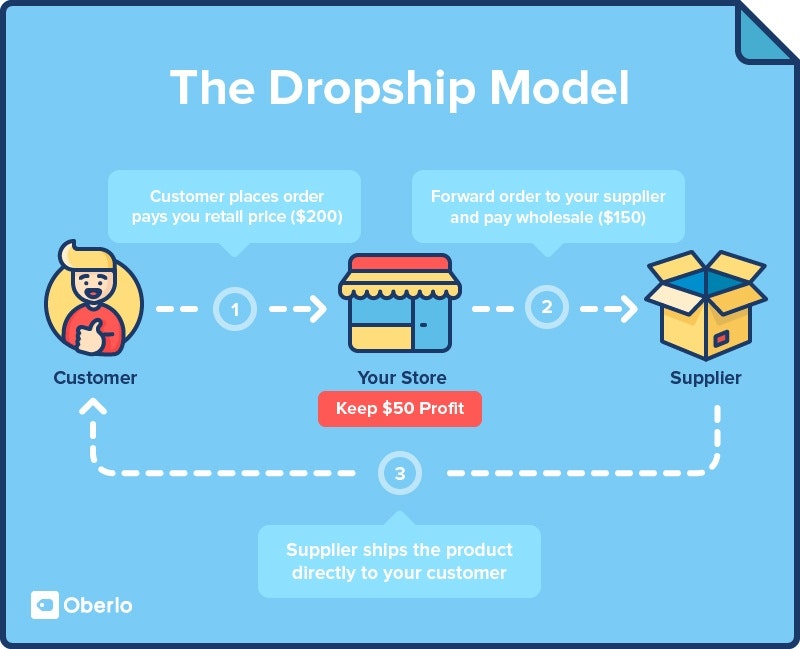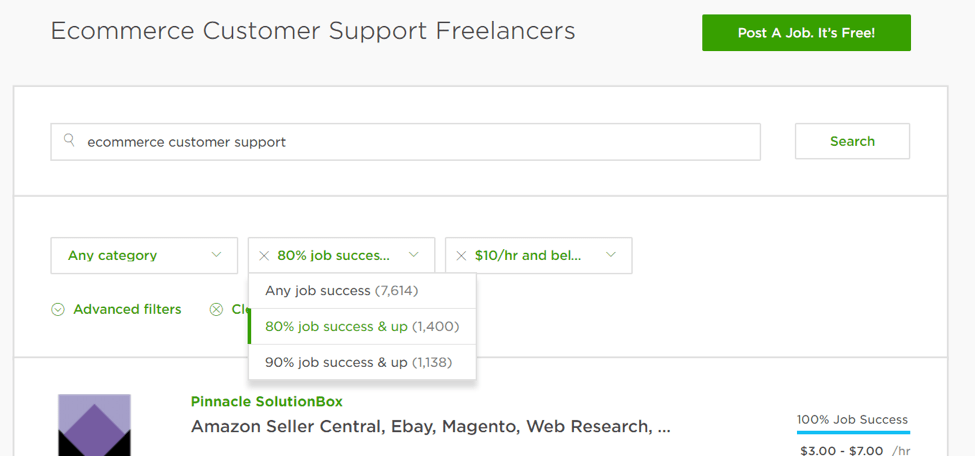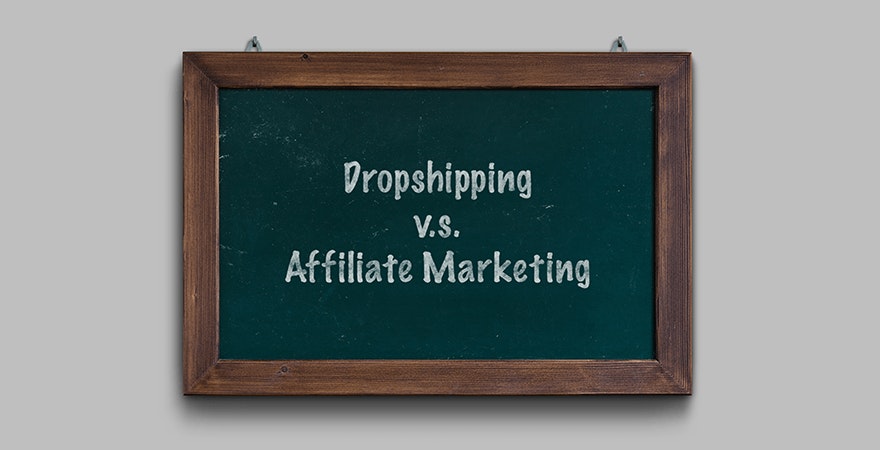Most entrepreneurs fall into two key categories: dropshipping vs affiliate marketing. Dropshipping is when the manufacturer carries the inventory and ships it to the customer on your behalf. In dropshipping, you set your own product prices and are responsible for marketing. Similarly, in affiliate marketing, the merchant also carries inventory and ships the product. However, while you’re still responsible for marketing, you don’t get to set the product price and only receive a commission. In this article, we’ll explain the pros and cons of dropshipping and affiliate marketing to decide which is more profitable.
Post Contents
- Dropshipping Vs Affiliate Marketing: Similarities
- Dropshipping Vs Affiliate Marketing: What is Dropshipping
- Dropshipping Pros
- Dropshipping Cons
- Dropshipping Vs Affiliate Marketing: What’s an Affiliate?
- Affiliate Marketing Business Pros
- Affiliate Marketing Business Cons
- Dropshipping Vs Affiliate Marketing: Is Affiliate Marketing Profitable?
- And the Winner is: Dropshipping
- How to Start Dropshipping?
- Want to Learn More?
Dropshipping Vs Affiliate Marketing: Similarities
While dropshipping vs affiliate marketing have many differences, they also have quite a few similarities:
- Both allow you to start a business without requiring inventory or shipping goods
- Both are relatively low-risk business models
- Both have high earning potentials
- Both are easy to start working on immediately
- Both require similar skill sets such as the ability to create ads, drive traffic to a landing page and other marketing skills
- Both businesses have low startup costs
Let’s look at the pros and cons of both starting a dropshipping and affiliate marketing business.
Dropshipping Vs Affiliate Marketing: What is Dropshipping


Don’t wait for someone else to do it. Hire yourself and start calling the shots.
Get Started FreeAs a business model, dropshipping allows anyone to sell products from suppliers on their own website. There is no need to carry any inventory at all. When someone purchases a product from the dropshipper’s website, they place an order with the supplier. The supplier then packages and ships the product to the customer. Dropshipping is a great business model for a first-time ecommerce entrepreneur or people who want to test categories of products on their audience. Ecommerce entrepreneurs have even been known to run their ecommerce stores while studying, or working full-time.
Dropshipping Pros
- Dropshipping is a Low-Risk Business Model
When comparing dropshipping vs affiliate marketing, dropshipping tends to be a little less risky in various ways. First, like an affiliate marketing business, dropshipping doesn’t carry inventory nor does it ship goods. This makes both models pretty low risk. However, with dropshipping, the risk is even lower as your funds become available each week. With an affiliate marketing business, there may be thresholds you need to reach before you can cash out your first cheque. For example, if you’re an Amazon affiliate outside of the US, you can only be paid by cheque or gift card. However, to receive the cheque you must have made at least $100. Yet, not everyone succeeds at making $100, when the percentages are really low. With dropshipping, you get paid what you made.
- Dropshipping Allows You to Have High Margins
When deciding between dropshipping vs affiliate marketing consider how much money you can actually make. The commissions in an affiliate marketing business can often be low in comparison to a dropshipping model. When dropshipping, you can buy a product that costs $1 and sell it for $19.99, which allows you to keep a substantial portion of the profit after marketing costs have been subtracted.
With affiliate marketing, commissions are a percentage of the product. Yet, when you factor your percentage, marketing costs and any other expenses, you’re left with a much smaller percentage. When comparing affiliate marketing vs dropshipping, you’ll likely be better off financially as a dropshipper.

- You’re Building an Asset
When you dropship goods, you’re building an asset – your brand. With dropshipping, you’ll have your own professional website. You’ll make enough money to invest in advertising, content and other traffic and money generating techniques. In a year from now, if you decide you want to move onto another niche, you can sell your business to someone else. However, not all affiliates have their own assets. Some affiliates make their money by creating YouTube videos. Yet, you’re not allowed to sell your YouTube channel. Between dropshipping vs affiliate marketing, you’re better off with dropshipping.
- You Have Multiple Chances to Lure in a Customer
When dropshipping products, you can easily retarget your audience to help convert the sale. With affiliate marketing, since you’re sending the traffic to another website, you have no control over retargeting. With dropshipping, the traffic comes to your own website. Also, you have control over the optimization of your landing pages, product copy, website design and more. The checkout will also match your website’s branding. As you have more control, you better your odds of attracting a customer and converting them.
Dropshipping Cons
- You Need to Manage Customer Support
The main downside to dropshipping is that as the store owner, you’re responsible for customer support. Fortunately, you can easily outsource the customer support to someone who specializes in it on Upwork.com for an affordable price. All you need to do is provide guidelines and general responses for the customer support representative to follow. By outsourcing this component, you free your time up to focus on marketing and optimization. This allows you to grow your business faster.

Dropshipping Vs Affiliate Marketing: What’s an Affiliate?
Affiliate marketing is modeled on commission. An affiliate receives a certain percentage of each sale that they are responsible for. In many cases, it is a high-profit, low-cost business model.
Affiliate Marketing Business Pros
- No Cost for Being an Affiliate
When running an affiliate marketing business, the costs are generally quite low. There’s usually no fee for the affiliate to pay as the merchant usually covers administrative fees on affiliate networks like Clickbank or Amazon Associates. The only costs that an affiliate typically pays for are their own website and server, which keeps costs low. However, as an affiliate marketer, you’re required to pay for the marketing costs as you’re the person driving traffic to the merchant’s website. Yet, as it is a business expense, you’ll likely be able to write it off during tax season.

- Excellent Source of Passive Income
An affiliate marketing business is an excellent source of passive income. There’s a bit of upfront work to figure out your ads or produce content to help convert the sale. However, once that’s done you can have ads running in the background while you make money. You don’t have to worry about creating a product. You don’t have to worry about shipping a product. All you need to do is make sure you’re sending highly targeted traffic to the merchant’s landing page to drive conversions.
- No Customer Support to Worry About
In an affiliate marketing business, the affiliate supplies the merchant with their leads. Thus, you’re not necessarily the product expert. As a result, the merchant handles all customer support issues. If the customer isn’t satisfied with their product, the merchant handles the refund. If a customer needs help with a specific aspect, the merchant is responsible for helping them. Thus, when it comes to customer inquiries all you need to do is direct customers to the merchant.
Affiliate Marketing Business Cons
- You Only Make a Percentage of Every Sale
When doing a comparison between dropshipping vs affiliate marketing, the biggest disadvantage of affiliate marketing is you’re paid on commission. You might’ve just spent $100 in ads only to make $50 back in commission fees. The payout for affiliate commissions is generally a lot lower than dropshipping. Even if your commissions are several hundred dollars, odds are the cost of the product is higher. This means finding the right people will cost more as well. Also, you don’t have the opportunity to set the price. For example, if people are interested in the product but feel the cost is too high, you can’t lower it to meet the demand of your audience. In addition, since you can’t set the price of your earnings, you’ll likely make a lot less than if you were the merchant.

- Payments May Be Delayed
In the battle between dropshipping vs affiliate marketing, an affiliate marketing business may have difficulty managing finances. This is because some merchants may be unreliable with their payment deposits. There are many great affiliate programs that make payments on time. Yet, sometimes, one of the companies you’ve chosen to be an affiliate for doesn’t pay on time.
Sometimes merchants are in the process of closing down or declaring bankruptcy. Merchants don’t need to specify this while an affiliate is hard at work trying to make their commissions. In the event that a merchant declares bankruptcy, the affiliate marketing business loses any money owed to them. This includes the money spent on ads and also their affiliate commission on sales made.
- People Can Remove the Affiliate Link
Sometimes, if you don’t use a link shortener, people can hover over the link and see that it’s an affiliate link. As a result, they may assume that it costs more to buy through the link. Most people do not understand that you only receive a commission on a sale. Thus, people may choose to manually go to the website you’re recommending directly without clicking your affiliate link. Since they didn’t click on the link, the merchant gets to make 100% of the profit. Thus, making your marketing efforts less successful. Many people are skeptical or dislike affiliate marketers. They feel like they’re being scammed, even when the truth is they’re not. It can be hard to convince people to trust you and click your link. In some countries, you need to disclose to your audience that the links you’re providing are affiliate links. Thus, making it even easier for a person to avoid clicking the actual link.

- No Control Over Products and Pricing
With affiliate marketing, you have no control over the product you are promoting. You cannot control the look, description, pricing, or the after-sale service of the product. This does not suit everyone. This can limit what you can do as an affiliate marketer from an advertising point of view. You may not be able to mention certain features due to your terms and conditions. If you do not personally receive the product you may rely on photos. These may be outdated or of low-quality, making it hard to promote the product effectively.
Dropshipping Vs Affiliate Marketing: Is Affiliate Marketing Profitable?
For example, if you’re an Amazon affiliate promoting fashion you can add integrated dropshipped goods to your store. Since you already have an audience, adding a store is an easy way to make money. In addition, the amount of work required for a store is mostly upfront work. This includes adding products to the store and writing product descriptions. Afterward, all you need to manage are your orders, marketing, and customer service. You can even outsource some of the work to make the workload even lighter.

If you’re skeptical about whether or not dropshipping is for you, test it. Slowly introduce dropshipped goods to your audience by choosing relevant products with high reviews and then follow our dropshipping tips for best results.
And the Winner is: Dropshipping
An affiliate marketing business is a great business to have as you can become very successful without incurring much cost. There are many advantages of this business model. But the disadvantages are heavily weighed around money you could lose by relying on other businesses. For this reason, even if you continue with affiliate marketing, having a dropshipping element is a good idea. It can help ensure a steady flow of income for your business. Running an online store makes you more money for the following reasons:
- You set your own product prices which are higher than affiliate commissions
- Dropshippers earn far more from physical goods than affiliates do
- You have a better chance of going viral or having a really successful ad campaign
- You can have affiliates send YOU traffic when running a store
- Customers will be more likely to come back to your website to buy more when dropshipping. Whereas when customers of an affiliate tend to go to the website you referred them to
- The cost of goods is low (allowing you to set affordable pricing for customers while having high margins)
- The everyday workload is light saving you time (time is money, of course)
- You can build a bigger audience as you’ll be your own brand
- You know through high order volume and reviews if the product will be an easy sell
How to Start Dropshipping?

Starting a dropshipping business has never been easier, or cheaper. You can dropship millions of products from Oberlo with a click of a button.
With the Oberlo, you’ll be able to do the following:
- Import each product with only 1-click
- Process orders in only a couple clicks
- Generate a sustainable income for yourself
- Set your own product prices to increase your margins
- Get free advice from other entrepreneurs in the community forum
- And more!
Start your dropshipping business for free today!
Is there anything else you’d like to know more about and wish was included in this article? Let us know in the comments below!




